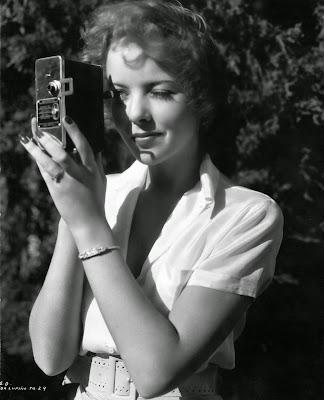With Kathryn Bigelow reeling in multiple best direction awards for "The Hurt Locker," and posed to beat her ex-husband James Cameron in the voting of the Academy of Motion Picture Arts and Sciences for best direction of 2009 early in 2010's Women's History Month, thoughts drift back to pioneering women directors, such as Dorothy Arzner (1897-1979), the first woman member of the Directors' Guild, and Ida Lupino (1918-95). Arzner had been a film editor before seizing the reins of directing; Lupino had been and continued to be an actress, the daughter of two English performers, Connie Emerald and Stanley Lupino, and the descendant of a line of stage performers dating back to the 17th century.
 |
| Ida Lupino |
With Kathryn Bigelow reeling in multiple best direction awards for "The Hurt Locker," and posed to beat her ex-husband James Cameron in the voting of the Academy of Motion Picture Arts and Sciences for best direction of 2009 early in 2010's Women's History Month, thoughts drift back to pioneering women directors, such as Dorothy Arzner (1897-1979), the first woman member of the Directors' Guild, and Ida Lupino (1918-95). Arzner had been a film editor before seizing the reins of directing; Lupino had been and continued to be an actress, the daughter of two English performers, Connie Emerald and Stanley Lupino, and the descendant of a line of stage performers dating back to the 17th century.
Her film career was accidentally launched in 1932 when she accompanied her mother on a casting call for American director Allan Dwan's "Her First Affaire." Dwan thought Connie Esmerald too old for the part, her daughter just right. She appeared in a number of forgotten English movies in 1933, then went to Hollywood with a Paramount contract. She quickly rebelled against playing blonde ingenues, and earned her first suspension for refusing a five-line part fanning Claudette Colbert's Cleopatra with palm fronds.
Her breakout year was the "annus miraculous" of 1939, costarring opposite Ronald Colman in an adaptation of Rudyard Kipling's novel The Light That Failed directed by "Wild Bill" Wellman. Signed by Warner Brothers, she starred opposite George Raft and Humphrey Bogart in "They Drive By Night" and opposite Edward G. Robinson (and John Garfield) in "Sea Wolf" in 1940. Her most indelible role came in 1941, playing an innocent waitress who falls in love with escaped convict Roy 'Mad Dog' Earle played by Humphrey Bogart in "High Sierra" (which was also a major step up in Bogart's career from playing second-fiddle to Raft, or James Cagney in Warner Brothers' gangster movies) in 1941. Although she is remembered as generally playing tough "dames, the only one of these starring roles who was ruthless, or even headstrong, was Lana in "They Drive By Night," a remake of "Bordertown" (1935) in a role Bette Davis played opposite Paul Muni. (The role of a prostitute in "Sea Wolf" was toned down to being a fugitive from justice, but the ruthlessness in the movie was all Edward G. Robinson.)
Lupino won the New York Film Critics Circle best-actress award for the 1943 "The Hard Way," a melodrama of sibling rivalry with Joan Leslie playing the more talented and successful sister. (Lupino was nominated for Emmies in 1957, 1958, and 1959, but did not win any.) Lupino played Emily Bronte to Olivia de Haviland's Charlotte Bronte in 1946. She had some good roles in movies with important directors during the early 1950s — Nicholas Ray's "On Dangerous Ground" with Robert Ryan in 1952, Robert Aldrich's "The Big Knife" with Rod Steiger and Jack Palance in 1955, Fritz Lang's "While the City Sleeps" with Vincent Price and Dana Andrews in 1956.
She was generally dissatisfied with the roles, often ones rejected by Warner's biggest (though also most rebellious) stars, Bette Davis and Olivia de Haviland. She took over directing "Not Wanted," a B-movie melodrama about a silly girl (played by Sally Forrest) who is seduced and abandoned by a nightclub piano-player (Leo Penn) when director Elmer Clifton had a heart attack part way through filming. Lupino received credit for the screenplay, but not for co-directing it.
Sally Forrest also starred, as a dancer who contracts polio, in "Never Fear" (1949). the most (only?) profitable Lupino movie, one that she also wrote and produced. Yet another young woman's life plans were disrupted in the next movie Lupino directed: Mala Prowess's character is raped in "Outrage" (1950). Like "Not Wanted," the subject matter was very edgy at the time.
Lupino seems to have directed some scenes in "On Dangerous Ground" without receiving any credit. She received both writing and directing credit for her most-remembered directorial effort, "The Hitch-Hiker" (1953).
Because the location is not urban (a deserted Mexican highway, then a deserted Mexican beach) and quite a bit of it takes place by day, I'm reluctant to classify "The Hitch-Hiker" as a "noir," but Lupino has been credited with being the first female director of a noir. A thriller it definitely is with William Talman (before he became the perennially losing prosecutor foiled by Raymond Burr's television Perry Mason) as the psychotic title character, picked up by Edmond O'Brien and Frank Lovejoy on their way to a weekend fishing in Mexico.
Lupino had her most stellar cast for the still rather B-movieish "The Bigamist" (1953), joining a cast with three Oscar winners: Joan Fontaine, Edmond O'Brien, and Edmund Gwenn.
She directed a few more movies, including "The Trouble with Angels" (1966) and appeared on the other side of the camera — most memorably as rodeo bull-rider Steve McQueen's mother in "Junior Bonner" (1972) — and guest starred on many television shows. (One tv drama that is available on DVD is the 1953 "House for Sale" from Singer's "Four Star Theater" in which she, Charles Boyer, Ida David Niven, and Dick Powell alternated: its on a compilation "Golden Age Noir, Volume One.")
Mostly, however, Lupino directed television episodes. Her first television direction was for a stand-alone drama,"Number Five Checked Out," in 1956 starring Peter Lorre, William Talman, and Teresa Wright from a story written by Lupino. She directed seven episodes of "Have Gun Will Travel," nine of "Thriller," four of "Gilligan's Island," three of "The Fugitive," and two of my beloved "The Rogues," among episodes for many other series. Although her directorial career began with "women's pictures," and there were some women-emperiled episodes of "Thriller," Lupino mostly directed in "male" genres (westerns, hard-boiled crime dramas). She said that she had gone from being "the poor-man's Bette Davis" as an actress to being "the poor-man's Don Siegel" as a director, which is to say never a producer's first choice. Nonetheless, she was a consummate professional in bringing in whatever she did get to direct on time and within its budget.


No comments:
Post a Comment